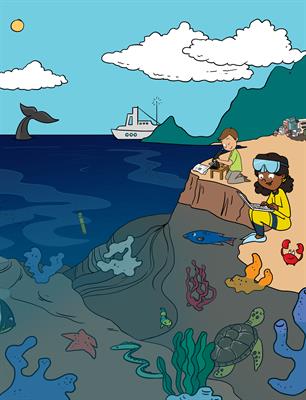
The Ocean, Volume 2
Collection Editors
Hervé Claustre, Carolyn Scheurle, Laura Lorenzoni, Sanae Chiba, Emily KingViews
306,468 viewsParticipating Sections
Submission Deadline
Closed
Articles

Earth Sciences
21/12/2021
How do Scientists Use Sound to Count Fish in The...
Authors
Alina M. Wieczorek, Amanda Schadeberg, David G. Reid
Biodiversity
06/10/2021
Plastics and Plankton in Our Seas
Authors
Penelope K. Lindeque, Zara L. R. Botterell, Rachel L...
Biodiversity
30/09/2021
Global Ocean Climate Change: Observing From Ships
Authors
Lynne D. Talley
Biodiversity
17/08/2021
Tiny Phytoplankton: The Most Powerful Organisms...
Authors
Patricia M. Glibert
Earth Sciences
12/08/2021
A Message in a Bottle From the North Pole–How...
Authors
Lisa W. von Friesen, Nanna B. Hartmann, Geir W. Gabrielsen...
Earth Sciences
09/08/2021
How Can We Use Ocean Energy to Generate...
Authors
M. Luisa Martínez, Rodolfo Silva, Janaina Garcia
Biodiversity
17/06/2021
Viruses—Agents of Change in the Oceans
Authors
Sarit Avrani, Daniel Sher
Earth Sciences
26/05/2021
Can Microplastic Pollution Change Important...
Authors
Meredith Evans Seeley, Bongkeun Song, Robert C. Hale
Biodiversity
04/03/2021
Do You Like to Breathe? Diatoms Can Help You With...
Authors
Leena Virta, Alf NorkkoAbout this collection
The ocean was the origin of life on earth billions of years ago and it is vital for the future of humanity. It is vast, deep, harsh and somehow “rebellious” to uncover its secrets and hence, there is much that is unexplored and misunderstood. Scientists need to study the ocean to better understand its functioning and properties, as well as how they shape our environment and impact us. For example, do you know what the role of the ocean is on weather and climate? There still remains so much to explore in ocean biodiversity and the diverse resources that can be found (for example, fish stocks, bio-molecules, and also minerals, oil, and gas). How can we make sure that our use of these resources is done sustainably and how can we minimize our impacts (e.g. pollution, acidification) on the ocean as our human population increases?In this Collection of Frontiers for Young Minds, scientists from various disciplines in oceanography share their knowledge and motivations, give insights in innovative tools and recent discoveries to better understand this ocean. The Collection will target a large range of oceanic environments from the open ocean to the coast, the surface to the abysses also including specific areas like coral reefs or sea-ice environments. It will cover marine disciplines that range from physics to chemistry, from biology to ecology and from economy to conservation and policies. It will address innovative tools and methods that are used to observe and characterize oceanic properties and features: ships and satellites, the highly diverse variety of robots as well as genomics or artificial intelligence. Finally, it will encompass a great variety of scales, ranging from the diel to geological time-scales and from loco-regional to global scales and also from the tiniest cells to the biggest living animals on our planet.
The United Nations have declared the 2021-2030 period as the “Decade of Ocean Science for Sustainable Development”, stressing the urgent need to approach fundamental issues related to the ocean and the future of humanity on well sounded scientific grounds and knowledge. This Ocean Collection aims to provide information to young readers that will help them to increase their understanding of the ocean and its central role in nature and our lives. We hope to empower them to make informed decisions in these challenging times and to engage to protect, study and enjoy its richness.
See here our previous Volume 1 !
Would you like to submit to this collection?
For researchers interested in submitting to this Collection, please consult our author guidelines and check that you have all the essentials included before submitting
















